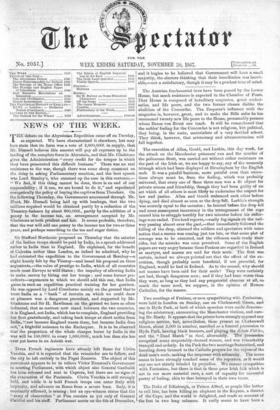The execution of Allen, Gould, and Larkin, this day week,
for the attack on the Manchester prisoners' van and the murder of the policeman Brett, was carried out without either resistance on the part of the Irish or, we are happy to say, any of the unseemly triumph which had been displayed at Birmingham by the English mob. It was a painful business, more painful even than execu- tions always must be, from the feeling, which was probably universal, that every one of these three men was a fit object for private esteem and friendship, though they had been guilty of an act which of all others is most likely to undermine the respect for law and justice. Allen and Gould embraced each other before dying, and died almost as soon as the drop fell. Larkin's strength was scarcely equal to the occasion ; he fainted before the drop fell and some consequent inaccuracy in the arrangement of the rope caused him to struggle terribly for two minutes before his suffer- ings were ended. Two loud reports,—really fog signals on the rail- way passing almost over the gaol,—that immediately followed the falling of the drop, alarmed the soldiers and spectators with some notion that a rescue was coming just too late, or that some plot of revenge was to be executed, and the riflemen made ready their rifles, but the mistake was soon perceived. Some of the English papers are very angry because these Fenians are regarded in Ireland as martyrs, and masses are said for their souls. The first was certain, indeed we always pointed out that the effect of the ex- ecution, though probably most beneficial, if not essential, for England, would be bad in Ireland. As to the second, why should not masses have been said for their souls? They were certainly not bad, though dangerous men ; and if they had been worse than they were, so long as they had any purgatorial chances at all, so- much the more need, we suppose, in the opinion of Roman. Catholics, for the masses.


































